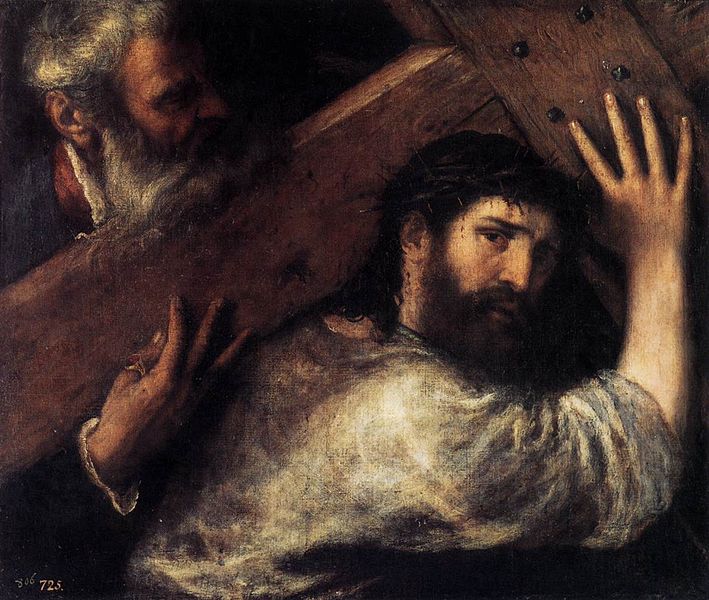Carrying Our Cross
 What does it mean to follow Jesus? In Luke 9:23, Jesus declares to his disciples, “If any man will come after me, let him deny himself, and take up his cross daily, and follow me.” This is a command we’ve heard many times, but it is always worth contemplating.
What does it mean to follow Jesus? In Luke 9:23, Jesus declares to his disciples, “If any man will come after me, let him deny himself, and take up his cross daily, and follow me.” This is a command we’ve heard many times, but it is always worth contemplating.
One sense of the word follow is “to imitate.” If we consider closely what Jesus is asking of us in the above passage, we may see something that has previously escaped our attention. It’s this: when we deny ourselves and take up our cross, we really do imitate what Jesus did, because what he did was deny himself and take up our cross. The cross he carried wasn’t his. It was ours.
Mel Gibson brilliantly depicted the moment Simon of Cyrene realized this truth in his film The Passion of the Christ. After Simon is coerced into carrying the cross, he feels distraught. He worries that the people in the crowd will wrongly assume that he is the criminal guilty of a capital offense. He stridently objects to the injustice he believes is being committed against him. He loudly publicizes his innocence as he and Jesus wind their way through the streets of Jerusalem, but, step by step, as they gradually ascend Mount Calvary, Simon realizes that he’s had it all wrong. Jesus is the innocent one; he is the sinner.
Unlike us, Jesus is blameless of sin against God or man. He didn’t deserve punishment. He doesn’t owe a debt to Justice. We do. Nevertheless, Christ willingly embraces both our cross and our crucifixion. He does so freely, out of love. Why he would do this is a mystery so great that it is incomprehensible when looked at from a paradigm of justice. We can only begin to understand it when we look at it through eyes of love.
When I taught high school, I would often ask my students what should be done about a society that was officially instituted to provide for the common welfare of its members, but in practice, systematically took advantage of one of them. The exploited person was always expected to eat cold food, take cold showers, and wear old clothes, so that the others—who rarely showed appreciation and regularly showed contempt—could have the best of everything.
They would decry the injustice and suggest everything from castration to crucifixion as a remedy. Then I’d drop the bomb on them: “That’s your family, and that exploited member is your mom.”
Crickets.
The thing is, most moms, like Jesus, aren’t motivated by justice; they’re motivated by love. This means they find happiness in making their loved ones happy. A good mom is more than willing to deprive herself for her children, but even a great daycare worker will strike if you try to make a mother’s level of commitment into the standard employees are expected to meet.
Love is the only thing that can make sense of sacrifice. The only right response to sacrificial love is love. We show our love and gratitude to Jesus by keeping his commandments, including the one with which I started this post.
Here are some things to consider as we try to follow the way of the cross.
The Cross Finds Us
Simon wasn’t looking for a cross to carry, but one found him anyway. We don’t have to hunt for new and more dramatic ways to suffer—our daily life provides crosses aplenty.
Some crosses are small—I brought my 14oz travel mug to Starbucks to save ten cents on my grande latte. When I asked how many ounces were in the grande I paid for the barrista said, “Sixteen, but it’s cool. Don’t worry about it.” Some are burdensome—my wife recently took our car in for an oil change and came out with a new transmission. (FYI, this costs more than a latte.) Some are crushing—a good family friend went to the doctor with what he thought was the flu. He was diagnosed with leukemia.
Everything from missed deadlines to miscarriages can provide us with opportunities to become more Christ-like. The guy who cuts you off in traffic, the waitress who gets your order wrong (again), the kid who gets sick on your annual report, the wife who forgets to thaw the chicken for dinner, the husband who walks out on you—these are all modern day equivalents of the Roman soldiers who dragooned Simon into carrying the cross.
We Shouldn’t Drag the Cross
We must learn to respond to all our suffering with cheerfulness and love. St. Josemaria Escriva gives this counsel:
. . . don’t drag the Cross…Carry it squarely on your shoulder, because your Cross, if you carry it so, will not be just any Cross: it will be…the Holy Cross. Don’t bear your Cross with resignation: resignation is not a generous word. Love the Cross. When you really love it, your Cross will be…a Cross, without a Cross.
And surely you, like Him, will find Mary on the way.
–Holy Rosary, “Jesus Carries His Cross”
Think of the Children
Parents are the primary educators of their children. How they carry their crosses will have a profound and lasting effect on how their kids respond to suffering. It’s one thing to tell your kids to “offer it up” or “kiss the cross”; it’s another to give them concrete examples of how to do it.
Here’s a good Catholic trivia question for you: what are the names of Simon of Cyrene’s children? Give up? Rufus and Alexander. It’s right there in the Bible (Mark 15:21) and I never paid any attention to it either.
According to tradition, both of these guys grew up to be Christians. Can you imagine their pride when they tell their friends that their dad was the Simon who carried the cross for Jesus? It would be their greatest boast. Wouldn’t it be something if it was your kids’ greatest boast, too?
My dad never taught me how to throw a spiral or restore an old car, and he doesn’t know one end of a hammer from another, but I thank God for him every day, because, man, can that man suffer.
About ten years ago, my dad had quintuple bypass surgery followed by a long and difficult recovery. He spent months in the hospital and the whole time he was praying for others. Through his prayers, he made his hospital room an oasis of peace. The nurses wept when he was discharged.
The other day when my mom was asked about my dad’s health, she said, “I was raised a Pentecostal and had no concept of redemptive suffering. For us, suffering was always something to be avoided. I guess God wanted me to teach me about it through my husband’s example.” Wow.
You Can Do It!
Finally, God is good. It’s important for us to remember that He will never give us more than we can bear. He gives us his Mother and the saints as examples to follow. He gives us the sacraments to heal and to strengthen us. We should always strive to be in a state of grace and to remain close to his will for our lives. If we do these things, we will be much more able to carry our cross with confidence.
[Note: This post was previously published on Catholic Phoenix in February of 2011. I’ll write new stuff soon, I promise!]

Great article with practical examples. Primarily, however, it reminds me that I have a lot of work to do both in prayer and execution. Intellectually and idealistically, I’m really great at accepting my daily crosses. Practically speaking, I’m not very good at any of them and I truly wish I didn’t have to say that. But it’s the truth.
Perhaps a cross to take up is one where you are reminded that you don’t do this very well. If that’s the case, then I take it up and thank you for reminding me of something which is a command from Christ Himself..
Rob, why didn’t you teach me in high school?
Great article.
Thank you for such food for thought.
Beautiful!
Wow Rob! I know you’ve been not feeling so well the last few days, and if this is the quality of your work when down, then one has to either wonder what you’d be like at 100% or think that you do your best work when most burdened!
Seriously, great piece of work here. The question to your students regarding mothers is wonderful. Think I will borrow that from time to time when it is appropriate.
Another thing I’ve pondered a couple of times, but never seen anything about, is that in that passage (Luke 9:23), Jesus tells them to take up their cross. Is there any commentary anywhere about the relation to the fact that Christ is ultimately crucified? I mean, I’m certain that Christ the Son knew ultimately He would face temporal death via crucifixion, but has anyone much more learned than me ever considered that point?
I also like what you said about not dragging one’s cross. I don’t think that one should always be “happy happy joy joy” over their burdens, but when we accept our crosses, and bear them with all that we have, aren’t we in fact able to bear them more fully? What if Jesus had said to God the Father, “well gee Dad, I guess I will go die for all the humans so they can love you, we, us in Heaven and enjoy enternity in your beatific vision, then okay, well, it’s gonna happen on Friday, and I don’t really have anything else scheduled that day, or for the rest of eternity, then sure, okay, yeah, I will die for them?” Hyperbole intended. We know that Christ accepted His role in Salvation, for only He, God made Man, the Incarnate Word, God the Son, could make restitution for our sins. Only God could reconcile us to Him.
I fall so far short in being anything like our Lord, much less imitate Him. But in reading this, and really meditating on it, perhaps I too can find a way to bear my crosses more joyfully, more fully, that Christ will find me pleasing before Him on the Last Day.
Thank you, Rob.
Ummm, wow! This is very, very good…. That paragraph about moms in a family…. yep, my kids are going to read that, ha ha ha!
Rob,
Great piece. The examples of both mothers and fathers, and how and why how we carry our crosses, were great.
I love St. Josemaría’s quote, I’ve always thought it is such an important thing to know and take to heart, even when it seems so difficult, that’s what being a christian is about.
This post was AWESOME Rob…Thank You for bringing This Easter Season more open to the HEART and Mind…